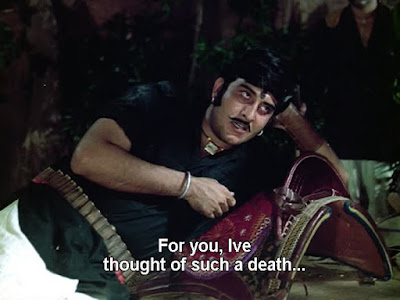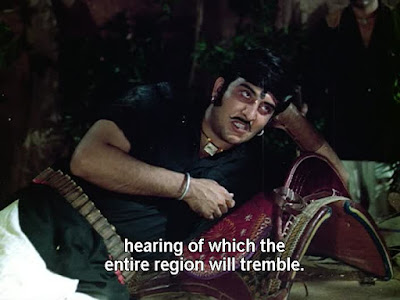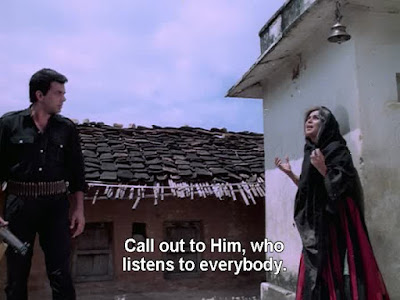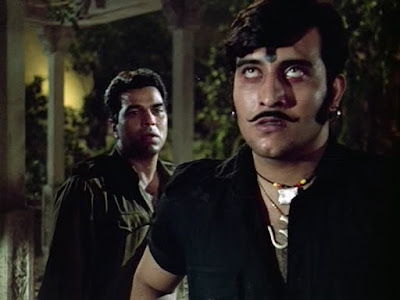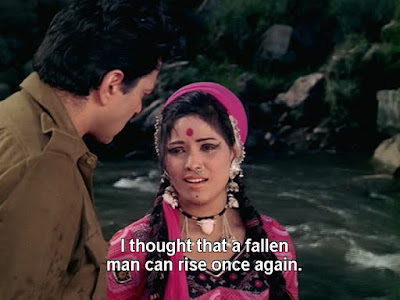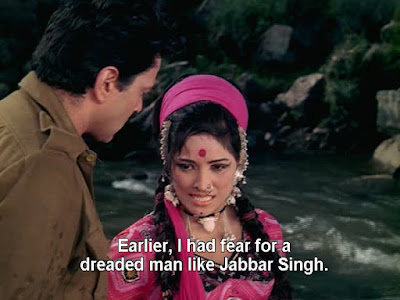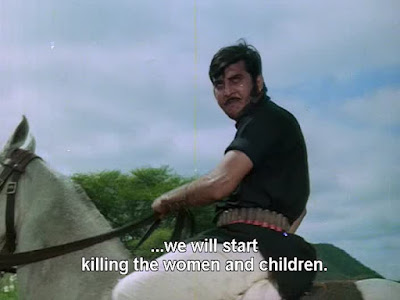Mera Gaon Mera Desh (Raj Khosla, 1971)
Like everyone else, I’d heard that this film was the alleged “inspiration” for Sholay. And it’s hard to argue otherwise – if you’ve seen both films, you can reel off a long list of the obvious similarities (which I actually won’t bother with here – why spoil a potential drinking game?) as well as some uncanny ones – did you know, for example that Jayant, who plays The Soldier in Mera Gaon Mera Desh, is Amjad Khan’s father? The Amjad Khan, of course, who famously got his big break playing cinematic LEGEND Gabbar Singh in Sholay (and who apparently wasn’t even first choice for the role).
ARE YOU FREAKING KIDDING ME?
But only minutes into Mera Gaon Mera Desh, a tiny bit of acting “business” from Dharmendra convinced me that given the choice between MGMD and Sholay, I’d choose the former every time.
It’s this. You remember, if you’ve seen Sholay, how Jai flips a coin to make decisions? Here’s how it works in MGMD. Pickpocket Ajit (Dharmendra) has just been released from prison. Someone has sent the prison a letter, saying that if Ajit needs somewhere to go, they will take him in. Ajit asks the warden for a coin, because that’s how he makes decisions – leaving it up to fate.
But as he leaves, the warden goes to say something to Ajit, and this is his reaction.
AND THAT IS WHERE I GOT HOOKED ON THIS FILM.
Weird, huh, the tiny things that can grab you? But it’s the moment when Ajit stops to give the coin back, his weary, apologetic assumption that the warden is accusing him of stealing a PENNY – his character needs no back-story because it’s all there in one perfect moment. And my dil goes mmm for Dharmendra.
Mmmm.
SO ANYWAY.
Mera Gaon Mera Desh is the story of aforementioned pickpocket Ajit (Dharmendra), who, after spending 6 months in jail is invited by the man who PUT HIM BEHIND BARS – if he had a name I didn’t catch it, the subtitles referred to him as The Soldier, so that’s what we’ll call him – to…well, get his life back on track, I guess, in a quaint little rural village. That also just happens to be regularly terrorized by a band of dacoits that everyone in the village is too cowardly to do anything about, and that The Soldier is too ONE-ARMED to effectively do anything about, even if he was brave enough.
Jayant, a.k.a. The Soldier a.k.a AMJAD KHAN’S DADDY!
The dacoits are led by the extremely menacing (but still quite sexy because he’s played by Hot Papa Khanna) Jabbar Singh – and this is where Sholay has the edge: Amjad Khan (though I am in fact in love with him) is an EXTREMELY convincing bad guy because he does…unexpected things. There’s the whole crazy laughter and soft voice that doesn’t match how he looks and just…an unnervingness about him, whereas Vinod, while he is brooding and dark…is just kind of too suave and ridiculously good looking to win in the villain stakes. Like, okay, HE ACTUALLY TWIDDLES HIS MUSTACHE AT ONE POINT.
I was like “Vinod, COME ON! That’s Evil Villain CLICHÉ 101!”
Don’t get me wrong though: VINOD KHANNA IS FREAKING AWESOME AS JABBAR SINGH.
What with repeated attacks on the village – the dacoits are merciless and amoral but it’s left to us to wonder and guess at the history*, Ajit pretty quickly realizes that he’s not there to rest and recuperate from his grueling 6-month stint in pokey. He is there to defend the village against Jabbar Singh.
Check out that mustache. Expertly twiddled.
So in between romancing village girl Anju (lovely lovely Asha Parekh),
Could it be saying: “Get a room, you two”?
Ajit recruits the help of dancing girl Munnibai (Laxmi Chhaya) to spy on Jabbar Singh – only Munni is BADNAAM (ha see what I did there?) and is a double agent, working for Jabbar too!
Or CAN THEY? Dun dun DUUUUNNNNN….
Actually, the whole femme fatale angle with Munni was AWESOME, because it was never clear until the end JUST WHERE HER LOYALTIES LAY. I’m going to echo EVERY single person who has EVER written up this film and wonder why Laxmi Chhaya never became a big star – she’s so cool, and totally has the best song – a steamy, sadistic number in which she is torturing Ajit and being a bitch to Anju for Jabbar Singh’s amusement:
Actually, the role of women in Mera Gaon Mera Desh is quite interesting – the women pretty much kick ass, and are given ample respect by Ajit (I’m thinking particularly of the stricken, substitute mother figure, and a village woman who is given the opportunity by Ajit to take revenge on a dacoit who assaults her). Munni is a central, and very strong character, given a prominent role to play in the action; Anju proves herself more than just pretty dancing wallpaper, displaying a feistiness and willingness to stand up to Ajit for her rights.
Okay, so maybe that translates into irresponsible use of a firearm. But still, Asha Parekh = AWESOME.
But maybe it’s not all refreshingly liberating: there’s this – when Ajit discovers Munni’s apparent betrayal, a scene which I know has dulled the feminist spark for some viewers:
Honestly, if anything, I think what is wrong with this scene is that Munni explains her actions by saying “OH BUT IT’S BECAUSE I LOVE YOU”. Because THAT makes women look like capricious, flighty beings and weakens Munni’s previously strong character. If you take objection to Ajit calling her a whore? He would have called a man a bastard or the equivalent. And Munni, when she is being reprimanded by Jabbar, is treated pretty much the same as he treats his other men. She occupies the same position as a man, I would argue, and is treated accordingly.
Except actually – can I just argue what will probably be an unpopular point of view and postulate that Ajit is treating Munni pretty much how he’d treat a man who betrayed him? I saw this scene as kind of like Ajit thinking: “If you want to be treated as an equal in terms of playing the game of espionage, banditry and the like, then expect the same punishment when it all goes horribly wrong. Don’t expect me to go easy on you just because you’re a woman”. For Munni to then turn around and try and use the excuse that she was a bad person until she fell in love with him reeks a little of her trying to use ‘feminine wiles’ to desperately get back in Ajit’s good books, rather than just accepting that she made a wrong decision and got caught out. The film gives Munni an opportunity to get ‘even’ with Ajit, anyway, in accordance with the ‘eye for an eye’ kind of justice Ajit himself seems to favour: Ajit assaults Munni in anger; Munni later gets the chance (seen in the song I posted above) to repay that violence on Ajit.
Mera Gaon Mera Desh is seemingly all about its characters standing up for themselves, even when faced with seemingly impossible odds: even if it means making the choice – like both Munni and Ajit have to – that is outlined at the start of the film in the title card:
And this film does get violent. The final showdown, where Ajit takes on the dacoits alone in the deserted village is nailbiting, edge-of-your-seat stuff: filmed (like the rest of the movie) from a variety of innovative, interesting angles, yet incredibly naturalistically (e.g. no gravity defying stunts, no martial arts super-wow moves: it’s like watching real people in a real fight).
He’s not kidding either. MGMD gets coldly brutal at points, to prove how little regard the dacoits have for human life and to underscore the challenge Ajit has in trying to conquer the cowardice of the village in standing up to the evil.
I know this is probably bordering on cinematic blasphemy, but I think I enjoyed Mera Gaon Mera Desh more than Sholay: for its naturalism, for the ambiguity and mystery surrounding the village/dacoit history, for the darker, colder undercurrent that runs through it (as opposed to Sholay’s perhaps more broadly popular masala feel). I’ve watched…way too many Deol films this month, and this is by far one of the best.
* One of the saddest and most intriguing threads of the story involves an old woman in the village, who upon seeing Ajit, claims he is her son who has returned to her.
At one point she says her son was killed but that she “gets confused”, at another point she says the dacoits took her son away; reference is made to a (living) dacoit, roughly Ajit’s age, who “used to live in the village”. No explanation is ever given about what actually happened to the woman’s son – other than it was something dreadful enough to clearly make her lose her mind.



